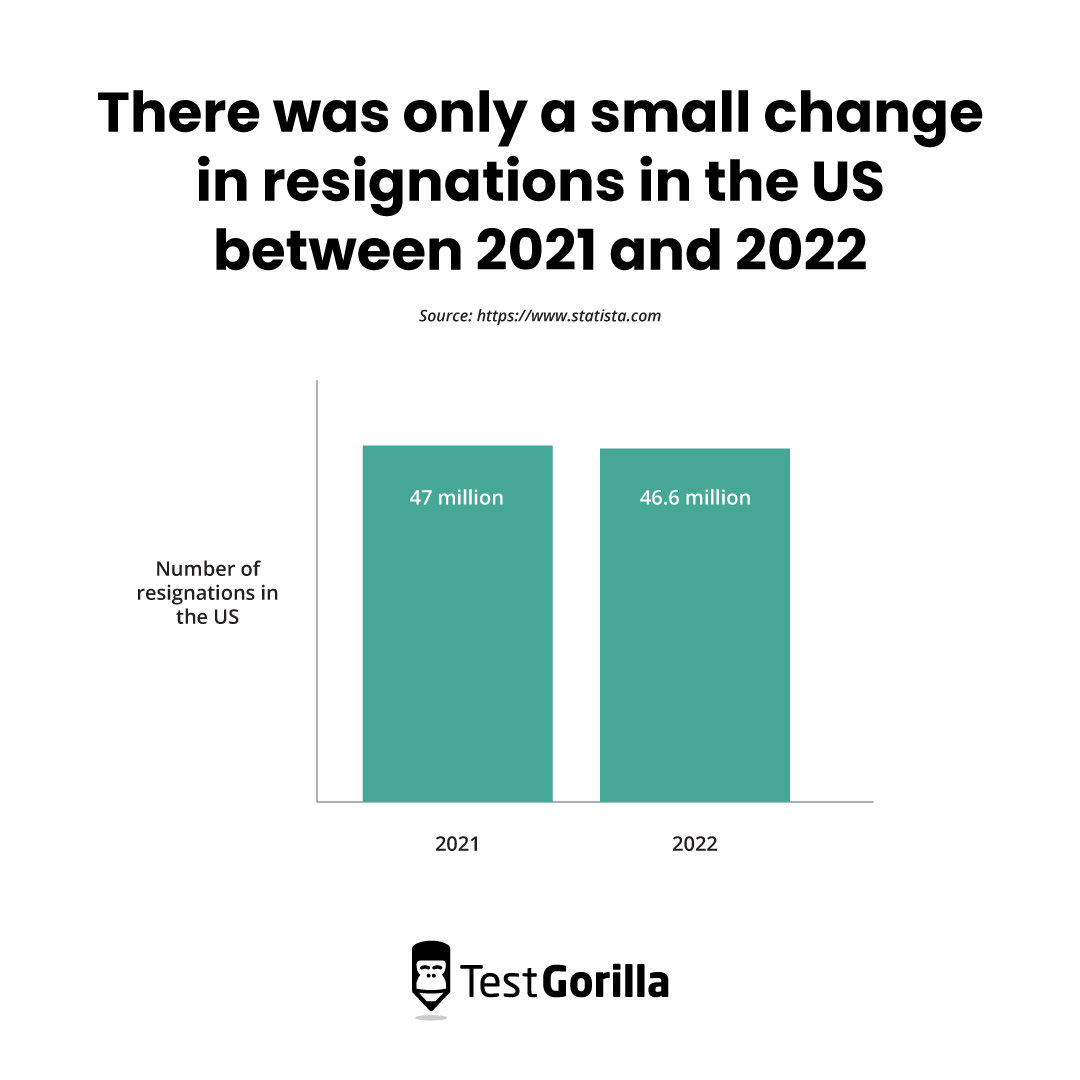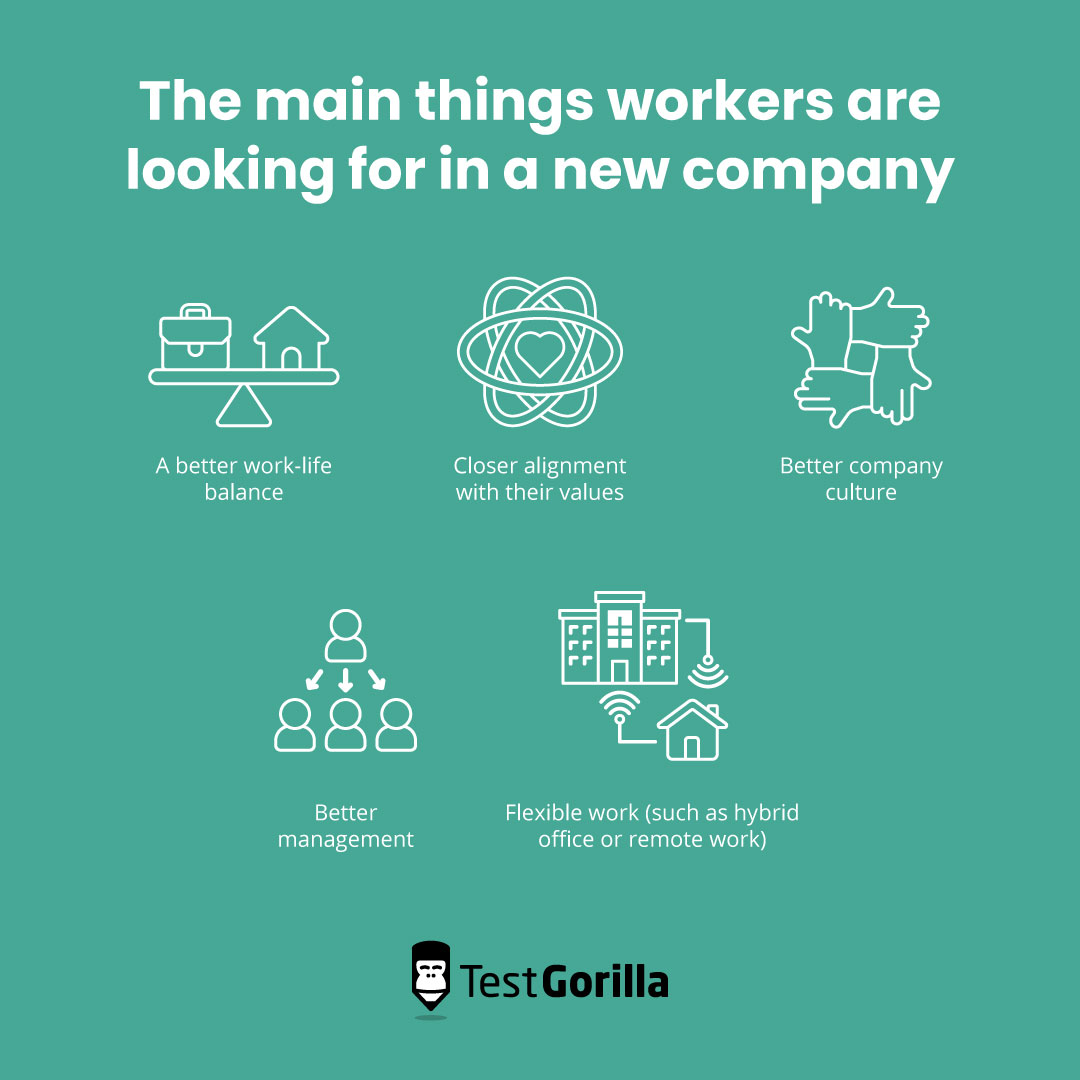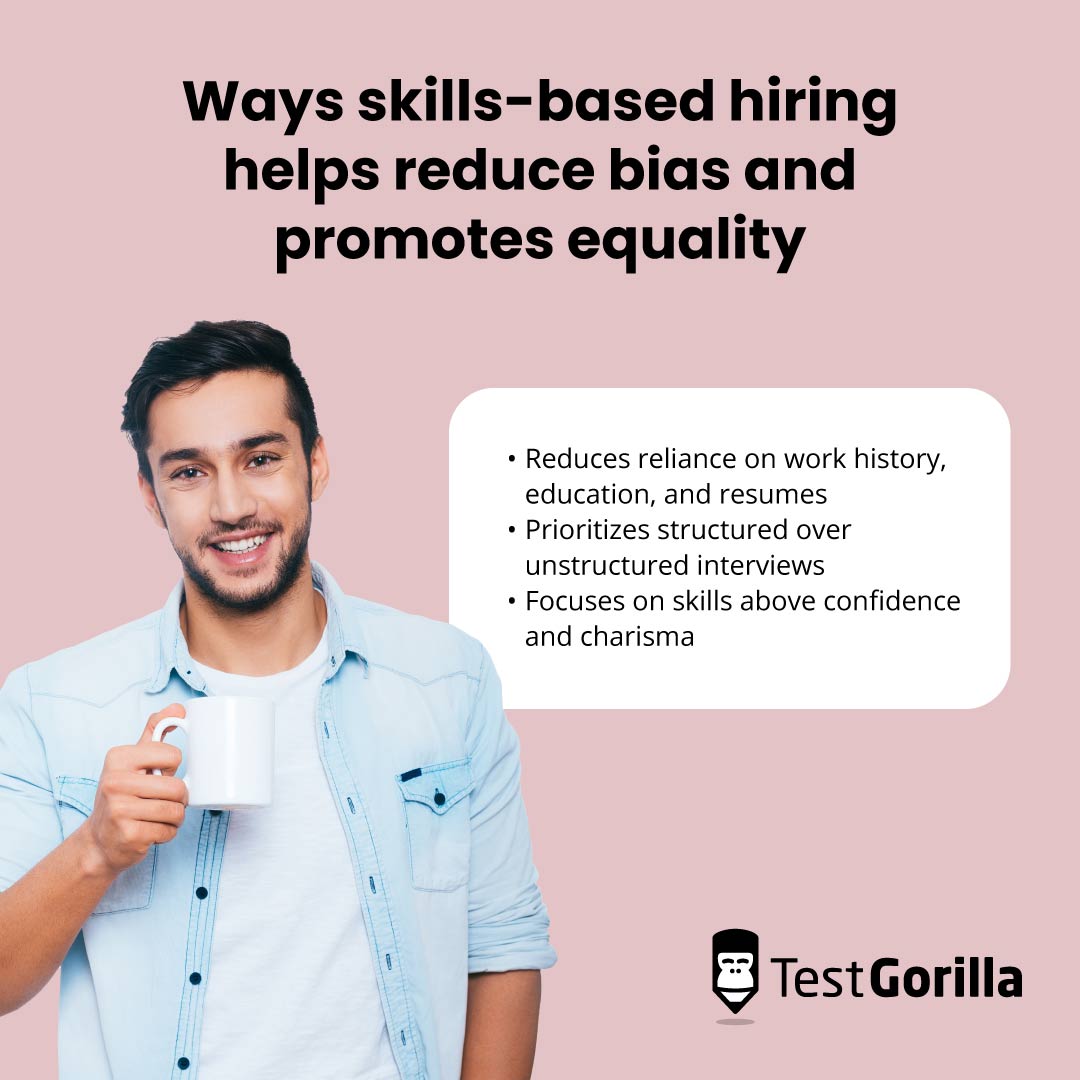The Great Reshuffle has had a huge impact on the modern workforce.
Workers are prioritizing their needs and won’t hesitate to hand in their resignation if they don’t see key green flags in an employer. These green flags include pathways for professional growth, a healthy company culture, and work flexibility.
So, where does skills-based hiring sit in relation to this issue?
Skills-based hiring plays an important role in helping businesses attract top talent that has grown dissatisfied with their current roles – talent that’s looking for real growth and fulfillment.
Adopting a skills-based approach also helps your company retain current employees by facilitating upskilling and internal mobility as well as improving diversity and company culture.
Let’s explore the connection between the Great Reshuffle and skills-based hiring. Skills-based practices don’t just solve this current issue, but also improve the working world to be better than before.
Table of contents
- What is the Great Reshuffle?
- Why the Great Reshuffle is happening: Modern workers have new needs
- How skills-based hiring helps employers through the Great Reshuffle
- The Great Reshuffle is an opportunity to reshape the working landscape
- Use skills tests to build a satisfied workforce in the midst of the Great Reshuffle
What is the Great Reshuffle?
Before there was the Great Reshuffle, there was the Great Resignation.
In early 2021, in the wake of the pandemic’s worst wave, millions of workers resigned en masse due to high dissatisfaction and a demand for better conditions.
As workers were leaving one company in favor of better offers at other organizations, the term “the Great Reshuffle” emerged.
Employees were leaving their jobs to find positions that offer a better work-life balance, a stronger culture, and flexible work.
Many workers would even take a better-suited role over high compensation. A study by Lever found that 31% of employees would take a pay cut to take on a new role they were more satisfied with. A further 61% would begin job hunting if their company didn’t help them start a new role.
The Great Reshuffle has definitely shaken up the labor market. The way employees feel about their companies has changed along with what they expect out of a role. Out of necessity, it has also changed how companies attract top talent.
Is the Great Reshuffle still in effect?
The Great Reshuffle remains fairly steady as of early 2023 with no clear end in sight.
Although some workers are concerned about a market change in the future, one study showed that 46.6 million Americans resigned in 2022, which is only a small change compared to the 47 million that resigned in 2021.
This shows that voluntary attrition is reducing marginally, but it’s still much higher than pre-pandemic levels.
Other sources predict continued attrition. A survey by Forbes found that 29% of employees are considering quitting their current employment in 2023.
In addition, results from our own State of Skills-Based Hiring 2022 report show that 36.2% of those under 34 said they were looking to change their role in the next two years while 49.3% said they had already switched careers within the past year.
This being said, even if the market improves and the Great Reshuffle calms down, the learning points for employers will be the same.
Employers should be providing key benefits and the right environment for employees to keep them satisfied and comfortable.
Companies can perform well during both fruitful and tough times when they offer what their employees want and build a healthy organizational culture.
Why the Great Reshuffle is happening: Modern workers have new needs
There’s a reason that many people are using “the Great Discontent” instead of “the Great Reshuffle.”
Employees are discontent with their current conditions and won’t settle for less than they need anymore. These people are empowered to find a better workplace and won’t simply tolerate difficult times for the company or until they get a promotion.
The Great Reshuffle might not be ending anytime soon. The good news that these shuffling employees are headed somewhere – and that somewhere will be whichever employer best fulfills their needs.
Why not make it your organization?
Let’s take a look at the main things that workers are looking for in a new company:
A better work-life balance
Closer alignment with their values
Better company culture
Better management
Flexible work (such as hybrid office or remote work)
Workers are looking for more fulfilling roles with better autonomy, more flexibility, and a healthy, supportive culture. People are prioritizing their wellbeing and satisfaction.
This means that compensation, non-traditional benefits, and flexible working arrangements can make the difference between a candidate accepting or rejecting a job offer.
Skills-based hiring can also make a powerful difference.
TestGorilla’s State of Skills-Based Hiring report showed that 56% of candidates prefer a hiring process with skills testing. Furthermore, 76% of people hired through skills-based hiring are either happy or very happy in their roles.
When an employee is hired for their capabilities and is truly suited to a role, it makes their job more satisfying and eases their desire to reshuffle.
Let’s take a closer look at how skills-based hiring can help you during the Great Reshuffle.
How skills-based hiring helps employers through the Great Reshuffle
A solid focus on skills and capabilities could be the solution to the Great Reshuffle.
Not all skills come from work history and degrees. The sooner employers recognize that, the sooner they can attract top talent that is reshuffling.
Skills-based hiring is gaining traction quickly. From 2019 to 2021, there was a 16% increase in job listings that ask for skills instead of experience or education.
Let’s take a look at the ways that skills-based hiring can help your organization during the Great Reshuffle (and for years to come).
Summary
How skills-based hiring helps | Description |
Removes biases and promotes fairness | Reducing bias opens your talent pool to thousands of nontraditional candidates |
Promoting equality improves your brand image and attracts top talent | |
Promotes upskilling and reskilling | Many shuffling employees are looking for development opportunities |
Focusing on skills facilitates easy upskilling | |
Encourages diversity | Employees are looking for a diverse, inclusive workplace |
Skills-based hiring eliminates demographic bias by focusing on skills over identity | |
Facilitates culture add | Shuffling workers want a culture they align with |
Personality and culture tests enable you to find like-minded candidates | |
Facilitates a better candidate-to-role match and reduces turnover | Skills-based hiring enables you to find candidates that have the right skill set to succeed in the role |
A better candidate to role match increases employee satisfaction and improves retention and lowers attrition | |
Facilitates career switching | Focusing on skills instead of experience enables candidates from unlikely backgrounds to find a place in your company |
Enabling career switching is essential when so many employees are shuffling to new industries |
Removes biases and promotes fairness
Skills-based hiring eliminates bias and promotes a level playing field for all candidates to succeed.
Here are the main ways it helps reduce bias and promote equality:
Reduces reliance on work history, education, and resumes
Prioritizes structured over unstructured interviews
Focuses on skills above confidence and charisma
That last point is important. You could be missing out on outstanding candidates when your process has an overreliance on perceived confidence.
We speak about this in-depth in our articles on the impact of confidence in a job interview and skills-based hiring, impostor syndrome, and the Dunning-Kruger effect.
Why does reducing bias help you during the Great Reshuffle?
It helps you in two main ways:
It expands your talent pool to diverse talent and career-switching candidates
It shows candidates that you prioritize equity, improving your brand image, and attracting more diverse applicants
Degree requirements narrow your talent pool, so removing all unnecessary requirements gives you access to candidates that are shuffling from someone else’s organization.
Our State Of Skills-Based Hiring report found that 56.5% of candidates feel they failed to pass screening processes due to a lack of relevant experience on their resumes.
Skills-based hiring ensures that strong applicants can be recruited, upskilled, or reskilled in the necessary areas, and reach their true potential.
Speaking of upskilling…
Promotes upskilling and reskilling
Thousands of workers left during the Great Reshuffle because they wanted new opportunities and professional development.
Upskilling and reskilling are imperative in the modern age. Skills-based hiring encourages and facilitates the internal mobility that every worker wants.
Skills-based hiring focuses on skills and development. When a candidate takes a pre-employment assessment, the results don’t just show you where they excel, they show you areas of improvement.
This helps you to discover where stellar candidates need work and enables you to build development plans for them from day one.
A great place to start is with a professional development plan. These documents lay out an employee’s goals and the strategies they can use to reach them.
Focusing on skills helps hiring managers to move employees up in their teams or even across departments with reduced reliance on the “right” background.
Once the employee finishes upskilling or reskilling, you can also verify their new capabilities using skills tests to ensure they’re absorbing their training.
Internal mobility is one of the most important strategies for solving the Great Reshuffle. It increases your employee retention and job satisfaction while also giving you a candidate who already knows your company culture and structure.
Encourages diversity
Skills-based hiring helps you to significantly increase diversity by reducing subjective bias and focusing on skills.
But how does diversity help your hiring efforts during the Great Reshuffle?
Increasingly more candidates want an inclusive environment and are attracted to companies that prioritize diversity.
In a survey done by Monster, 83% of Gen Z candidates said that a company’s commitment to diversity and inclusion is important to them when choosing a place to work.
This is backed by the number of organizations that have powerful DE&I initiatives. TestGorilla’s State of Skills-Based Hiring report found that 80% of companies had a goal of increasing diversity in 2022.
On top of that, 91% of employers saw an increase in diversity when they started using skills-based hiring.
A diverse workforce doesn’t just attract top talent. It carries a wealth of other benefits such as increased innovation and creativity, a boost in productivity, and improved performance.
A study by McKinsey found that gender-diverse and ethnically diverse teams perform better financially. To read about these benefits in-depth, check out our blog on the benefits of diversity.
Facilitates culture add
Many of the workers are leaving their current positions to find better value alignment with their company.
Values and culture are essential to an employee’s happiness. In fact, culture is a top job satisfaction factor for employees, ranking even higher than compensation.
Skills-based hiring helps employers find the right cultural match for their company by using personality and culture tests.
We believe in using these tests to hire for “culture add” over “culture fit.” Culture add is the practice of finding like-minded but unique individuals that align with your base values but bring their own diverse perspectives with them.
Our Culture Add test helps hiring managers build and nurture an environment of diverse beliefs that complement each other.
A healthy company culture is exactly what these shuffling employees want: A work environment that matches their beliefs but also supports them in their unique opinions.
For more information on this topic, check out our extensive blog on culture add.
Facilitates a better candidate-to-role match to reduce turnover
Assessing skills, both technical and soft, ensures a better match and predicts more job success so candidates are less likely to feel unsatisfied and shuffle again.
According to the State Of Skills-Based Hiring report, 58% of organizations said that skills-based assessments were more effective than resumes in identifying talented candidates.
A further 55% agreed that these were good predictors of on-job performance.
Skills assessments help you evaluate technical skills, soft skills, and personality – in other words, you can use them to evaluate all dimensions of a candidate.
This helps you find the best person for the role, which fills skills gaps in your company and helps you assemble high-performing teams.
In our research, only 3.2% of respondents recruited using skills-based hiring reported thinking of leaving their roles in the next 12 months, versus 7.3% of those who weren’t recruited this way. Additionally, 9 out of every 10 of the organizations we surveyed are seeing an increase in employee retention.
Why? Because when an employee is hired for their capabilities, prepared for the role, and passionate about the position, they’re much more likely to stay. When employees feel like they “belong,” they aren’t likely to shuffle again.
Facilitates career switching
Skills-based hiring opens up more opportunities to jump industries and change careers than traditional hiring.
When skills come first, candidates can try for positions they wouldn’t have access to if a degree or a certain amount of experience was required. As long as they score high on the assessment, their former job is irrelevant.
**This is essential during the Great Reshuffle when so many candidates are leaving their former positions and exploring what they truly want out of a career.**Traditional processes that have a heavy reliance on experience, resumes, and degrees, can potentially box candidates into one industry forever.
Jozefina Hoswza, a UX researcher at TestGorilla, is passionate about skills-based hiring’s ability to facilitate career flexibility. She believes that it puts undue pressure on people to decide their career path at age 18. Enabling people to switch paths gives them a feeling of freedom and allows them to explore hobbies and find their true calling.
“If you study psychology and you suddenly decide you want to be a product marketer, people won’t give you a chance because you studied psychology and not marketing. But in reality, you might have far better skills than someone who studied marketing.”
These diverse backgrounds may even be beneficial in their new role. A marketer with a sales background could have great insights about your audience that lifelong marketers might be missing.
To read Jozephina’s story and many more, check out our 10 stories that demonstrate the power of skills-based hiring.
The Great Reshuffle is an opportunity to reshape the working landscape
The Great Reshuffle has been overwhelming, and it’s definitely shaken up the working world.
But it’s also a chance for employers to embrace change.
The Great Reshuffle is an opportunity to shape a new working world. We have the chance to create new norms, build better employer/employee relationships, and create healthier working cultures.
WhenGreat Reshuffle is a thing of the past, employers and employees will be grateful for the changes it instigated.
Aubrey Bergauer, chief executive of “Changing the Narrative,” believes skills-based hiring is not only the solution to the Great Reshuffle, but that it’s the future of hiring.
“I’m pretty annoyed when I give recs of people who are great, and then I hear they were never contacted because they don’t check a non-skills-based box (ex. the employer doesn’t like the previous orgs they worked for). This is bias. What org someone previously worked for is not a reliable indicator of if they have the chops for the gig.”
Aubrey Bergauer, chief executive of “Changing the Narrative”
Aubrey believes that a solid hiring process shouldn’t require a degree, but it should offer special accommodations and use skills-based interview questions.
Strengthening our work practices now prevents future discontent. Skills-based hiring is helping companies build a more successful, less discontent workforce that changes employers and employees’ lives for the better.
Use skills tests to build a satisfied workforce in the midst of the Great Reshuffle
Skills-based hiring creates an environment that the modern worker is looking for: A better culture, new learning opportunities, the chance to switch industries, and a more diverse and inclusive workplace.
What modern workers expect from work has shifted. So our hiring practices have to shift, too.To get started planning your first skills-based job ad, check out our article on how to prepare job descriptions for a skills-based hiring approach.
Related posts
Hire the best candidates with TestGorilla
Create pre-employment assessments in minutes to screen candidates, save time, and hire the best talent.
Latest posts
The best advice in pre-employment testing, in your inbox.
No spam. Unsubscribe at any time.

Hire the best. No bias. No stress.
Our screening tests identify the best candidates and make your hiring decisions faster, easier, and bias-free.
Free resources
This checklist covers key features you should look for when choosing a skills testing platform
This resource will help you develop an onboarding checklist for new hires.
How to assess your candidates' attention to detail.
Learn how to get human resources certified through HRCI or SHRM.
Learn how you can improve the level of talent at your company.
Learn how CapitalT reduced hiring bias with online skills assessments.
Learn how to make the resume process more efficient and more effective.
Improve your hiring strategy with these 7 critical recruitment metrics.
Learn how Sukhi decreased time spent reviewing resumes by 83%!
Hire more efficiently with these hacks that 99% of recruiters aren't using.
Make a business case for diversity and inclusion initiatives with this data.























